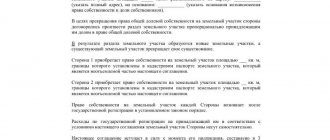Updated: January 3, 2021, at 10:01 am
Citizens living under a social tenancy agreement can register their housing as their own property, taking advantage of the right of free privatization. According to the law, this right is given to a person once. However, there are a number of circumstances in which re-privatization of an apartment (housing) . To whom is it available, can it be carried out, if a citizen has real estate - it’s worth figuring out.
If you own two apartments, is it possible to privatize the second one?
According to the clauses of the Federal Law “On Privatization...” a person can privatize property only once, i.e. for one property - the only free opportunity .
You can obtain permission to obtain state or municipal property for a second home for a fee, not through privatization, but through redemption.
If a citizen who wishes to obtain ownership of square meters owns a residential plot or part thereof, he has the right to receive this property through a paid agreement, through a gift agreement, or through inheritance.
It is also noted that the service is provided only in the case of one-time participation in privatization of minor citizens, who in fact have the right to register property if there are two apartments or parts of the ownership of them:
• first I – in childhood;
• second – after reaching adulthood.
Part of the previous housing is not taken into account, even if in adolescence the square meters become fully owned.
A person living in privatized property after reaching the age of majority can submit documentation for free privatization of state property where he is registered today. This issue is regulated by housing and civil legislation.
Is it possible to privatize an apartment with debts? Read the article.
For minors, the law provides for a second opportunity to receive free privatization. After the second registration of the property has been carried out in accordance with all requirements, persons over 18 years of age can use their opportunities to obtain state-owned residential space.
Who has the right to it
Who can participate in privatization twice:
- Citizens who, before reaching adulthood, have already participated in the privatization of an apartment together with their official representatives - parents or officially appointed guardians.
- Citizens who have previously returned their privatized apartment to the municipality. For example, the owner had a privatized apartment that did not meet his requirements. According to the terms of privatization, the future owner must sign a bilateral agreement, which can be terminated if necessary or desired. It turns out that the apartment is returned to the municipality, and the citizen begins the process of privatization for another living space.
- The previous agreement with the municipality on the transfer of property rights is declared invalid in court.
These are the only possible cases when re-privatization of an apartment for one citizen can occur. The legislation does not deny the existence of other individual cases when re-privatization may be permitted.
Be that as it may, only a person who participated in the shared registration of property rights before coming of age can receive living space from the state twice.
looks at the certificate of privatization of the apartment, find out in the article: certificate of privatization of the apartment. Privatization of a room in a communal apartment is discussed on this page.
Rights and obligations of relatives of the tenant of the premises
The main document is a social tenancy agreement . It indicates the duration of the lease of the premises, the number of tenants, their obligations and all rights.
In practice, such agreements are lifelong:
1. Family members of the main tenant - the official spouse living together, all children and his parents.
He can recognize other relatives as equal members of the family if their data is included in the text of the social tenancy agreement, including family relations. And living together, they run a joint household.
And other persons are separately recognized as relatives of the employer through the court.
2. It turns out that close relatives who live with the employer have the same rights and a number of responsibilities. Everything is spelled out in the contents of the social tenancy agreement.
3. Their details must be indicated in the contract. Full name, residence status, relationship.
4. When a citizen ceases to be considered a family member of the employer, but while living together, he retains his original rights. He must independently fulfill his obligations. The termination of family relations does not affect his position as a tenant of the premises.
People who leave the specified apartment automatically lose the opportunity to participate in the planned privatization. The presence of a warrant or their data in the social rental agreement does not change the picture.
Important! They must express written consent to the procedure.
How much does it cost to privatize an apartment in 2021?
The privatization procedure itself is free . Additional costs are required only for the production and collection of the necessary certificates and documents. Here is a list of the main expenses:
- fee for state registration of property rights - 2000 rubles (if several people participate in privatization, the fee is divided between them proportionally);
- extract from the Unified State Register of Real Estate - 200 rubles ;
- registration certificate of the apartment - from 1500 rubles ;
- notarized power of attorney - from 300 to 2000 rubles .
If you collect the documents yourself, you will have to spend between 3-5 thousand rubles, depending on the region. For registration of privatization, you can contact specialists (lawyers, real estate agency employees). The fee for such services can be more than 20 thousand rubles.
A citizen can receive some documents for free. For example, a copy of the social tenancy agreement, as well as an extract from the personal account. In addition, through the State Services portal you can pay the state duty with a 30% discount (clause 4 of Article 333.35 of the Tax Code of the Russian Federation).
When is a repeat possible?
By law, this is a one-time right. However, there are circumstances that give a citizen the opportunity to participate again:
1. The first time they appeared in the procedure was when they were minors. If such citizens are later provided with other municipal real estate for living, they have the right to appropriate it. It doesn’t matter when you left your previous home. The only condition is that that apartment or its share does not belong to them.
2. Persons who lost their housing due to emergencies. For example, a man-made disaster, a terrorist attack or a natural disaster. Force majeure depriving people of privatized housing. If the authorities provide the victims with other municipal housing, they will be able to register it as property.
3. Migrants who left countries - former members of the USSR or the Far North. They transferred the living space they occupied there to the original owner – the state.
Important! The right to privatize will be lost if they gave the registered property to others in accordance with the alienation agreement.
People who participated in the registration procedure as children can receive a second home as adults. After all, their right is preserved. It doesn’t matter whether they then received part or the entire premises.
Return of rights after completion of deprivatization
Deprivatization is the right of citizens who have previously privatized to return property to the state. In practice, this happens quite often and for different reasons. As a result, the registration transaction is declared invalid.
Deprivatization is possible:
1. The contract was terminated due to the initiative of the owner. The participant in the procedure, having reviewed the decision, can independently cancel the transaction. If you consider it profitable to occupy municipal housing. The reasons are different - the impending divorce of the spouses, security reasons, a planned family move.
2. The contract officially declared invalid . Due to a violation of the participant's rights. This can be initiated by local authorities or ordinary individuals.
A citizen who voluntarily terminates the contract loses the opportunity to re-privatize. He himself decorated the apartment, became its owner and decided to return the property to the state. Thus, realizing the right of free privatization.
An invalid contract is considered incomplete by law. The property was not actually transferred. Therefore the right remains.
Consequences of an invalid transaction
They are reflected in the provisions of Article 167 of the Civil Code of the Russian Federation.
Any invalid transaction is considered unfinished:
1) Does not have serious legal consequences. Except for those that occurred after the change of status.
2) A person who initially knew about the reasons forcing him to challenge the transaction is considered to be dishonest. After all, it acted secretly, knowingly hiding information from the other participants.
3) The parties are obliged to return to each other the benefits received after the conclusion of the transaction. What cannot be returned in its original condition must be compensated in another way. In kind or materially - in money.
4) If the disputed agreement on its merits can be terminated in the future, the court, recognizing its invalidity, indicates the required period of time.
5) The court may cancel the consequences of a contested transaction if they contradict legal, legal or moral principles.
Important! It is easier to challenge a contract that violates the law
If privatized housing is demolished
According to the law, it is impossible to appropriate property that is subject to imminent demolition. It happens that initially the living space was considered prosperous, but after privatization the building was demolished. Then the owners are obliged to give property of equal size and other characteristics. So that their living conditions are preserved.
If demolition of a municipal apartment (the building where it is located) is planned, all residents registered there on social rent must receive a new one. Moreover, the dimensions of the room will be calculated in accordance with the provisions of the law, which determines the norm per person.
It does not matter whether the demolished apartment was larger or smaller.
Registration of re-privatization
It works as standard, there are no differences . The only thing is the basis. Citizens have the right to carry out gratuitous (free) privatization or purchase state real estate.
The second option is available to everyone; it is not lost due to a previously performed procedure. Paid privatization means a person's participation in auctions organized by local authorities. The winner will be the buyer who quotes the best price.
Set of documents required for privatization:
· social tenancy agreement;
· registration certificate of the premises (issued by the BTI), or perhaps a cadastral passport (issued by the Cadastral Chamber);
· citizen’s statement – where he expresses his intentions to register living space;
· personal documents – the applicant’s passport, for married people – their marriage certificate;
· extract from the house register/passport office (reflects a list of all registered persons);
· personal account statement;
· housing and communal services certificate – no utility debts;
· BTI certificate - that the citizen has not previously carried out privatization;
· USRN extract (given by Rosreestr).
If a minor is involved in the transaction - written approval of guardianship . There are other registered residents in the apartment - their written refusals certified by a notary.
Procedure:
1. The initiator of the procedure gathers the remaining residents and notifies them . If they refuse, everyone must put it in writing. The document, after being certified by a notary, is handed over to the interested party.
2. There is a child among the residents - visit the local guardianship authorities . Explain to the employee the situation and your intentions. If the initiator is a parent, he will include the minor among the participants in the procedure. Guardianship will approve if the transaction ultimately improves the child’s existing living conditions.
3. Assembling documents . Their list may change depending on circumstances. The finished kit is supplemented with a receipt of paid state duty.
4. Submit the application and other documents to the MFC branch or local privatization department.
5. Wait for the decision of the responsible authority. Then obtain the owner's certificate.
As a result, the initiator of the procedure will become a full-fledged owner.
The procedure for the second free privatization
In fact, it will not be much different from the usual one. To do this, you will need, as before, to collect a standard package of documents provided for by local regulations. In the case when it comes to canceling privatization by court, it may be necessary to attach a court decision. The applicant will need:
- Passports of privatization participants,
- Birth certificates of minor participants in privatization,
- Extract from the Unified State Register of Real Estate,
- Technical passport for apartments, issued by BTI,
- Certificate of family composition,
- Notarized waivers from those residents who will not exercise their right,
- Extract from the house register,
- A certificate stating that the applicant has not previously participated in privatization as an adult. If privatization was canceled by court or the apartment was deprivatized, it would not be superfluous to have documents confirming this fact.
As before, the easiest way is to submit documents to the MFC. Its employees will transfer it as quickly as possible to the authorized body, which within 2 months will make a decision on the possibility of re-privatization.
Deprivatization
The owners voluntarily return the apartment to the state. If a child/disabled/incompetent citizen previously participated in privatization, it is not possible without the approval of guardianship.
How it goes:
1. The owners write a detailed statement indicating their intentions to return the property.
2. Collect the necessary information and prepare documents.
3. Submit the finished kit with an application to the local Housing Committee.
4. 2 months are given to the commission to study the situation, make a decision and draw up an agreement.
5. The parties sign the completed agreement, and the deal is considered concluded. The property is then transferred to the state. The new owner is registered in Rosreestr.
6. If necessary, the former owners enter into a new social rent agreement with the municipality in order to continue living in that apartment or get another one. But we must remember, when deciding to take such a step without a good reason, that the municipal apartment is not your own and can be evicted from it.
This often happens after a couple divorces. For example, the family broke up, and the son-in-law agreed to leave, giving up part of the property. He will regain the right to one-time free privatization.
After deprivatization, persons planning to re-register must contact the Housing Inspection office again . Submit an application, and if the organization allows, pay the state fee and collect the remaining documents.
The procedure for privatizing an apartment: step-by-step instructions
The process of housing privatization takes place in several stages:
- First, you need to obtain consent to participate in the privatization of all citizens registered in the apartment, including minors. If one of the residents does not want to participate in privatization, you need to get a written refusal from him.
- Submit an application for transfer of ownership of the apartment along with a package of necessary documents to the housing department of the local administration or multifunctional center (MFC).
- The authorized body must verify the information received . The application must be considered within a maximum of 2 months, excluding weekends and holidays (Article 8 of Law No. 1541-1).
- If a positive decision is made as a result of the inspection, the applicant will receive a contract for the transfer of ownership of the apartment . Minor participants in privatization aged 14 to 18 years sign the agreement with the consent of their parents or guardians. For children under 14 years of age, signatures are provided by their legal representatives.
- The signed agreement is transferred to Rosreestr . Afterwards, the document will be handed over to the owner with the appropriate registration mark and an extract from the Unified State Register.
A privatized apartment can be sold, donated or exchanged for other property. Also, real estate can be inherited, pledged or rented out.
Deadlines
If deprivatization occurred before re-registration, this affects the duration of the process.
| Procedure | Deadlines |
| Submitting an application - citizens voluntarily return the apartment they have assigned to the state. Consideration of the application | 2 months |
| State registration of property rights | 14 days (taking into account the period of drawing up the contract, collection of papers, study by Rosreestr) |
| Submitting a second application for privatization (repeated) | 14 days the commission reviews |
| Need a new registration certificate | 2 months |
| Submitting documents for the second time to Rosreestr | 10 days |
In general, it will take six months.
Lawyers advise assessing the need for re-privatization in advance. And complete it without wasting time. Employees of the authorities check each document submitted by the visitor.
If the kit is incomplete, this complicates the process. The citizen is sent a refusal with clarification, where the names of missing or inappropriate certificates are indicated. Having corrected the shortcomings, you can resubmit your application.
Documents for privatization of an apartment
To privatize an apartment in 2021, you will need the following package of documents:
- a completed application form for the privatization of living space from all residents registered in it;
- originals and copies of identity documents: for adult citizens - passport of a citizen of the Russian Federation;
- for persons under 14 years of age - birth certificate;
Additionally you may need:
- a certificate from the guardianship and trusteeship authorities - if children under 14 years of age are registered in the apartment;
- in case of change of passport data - documents confirming the change of surname, patronymic, first name of the applicant or members of his family;
- when applying through a representative - a passport and a notarized power of attorney;
- certificate of the child’s place of residence - if he is registered in the apartment, but does not live in it;
- in the event of the death of a tenant previously registered in the premises - a death certificate.
It is important to remember that some documents have a certain validity period. For example, a personal account statement is valid only for a month. To avoid refusal to accept documents, it is better to consult in advance with the MFC or the privatization department and find out exactly which documents are best to receive first and which ones immediately before submitting the application.
The procedure may be suspended for up to 1 month if one of the documents is missing. If one of the residents refuses privatization, the process will be significantly delayed or stop altogether.










